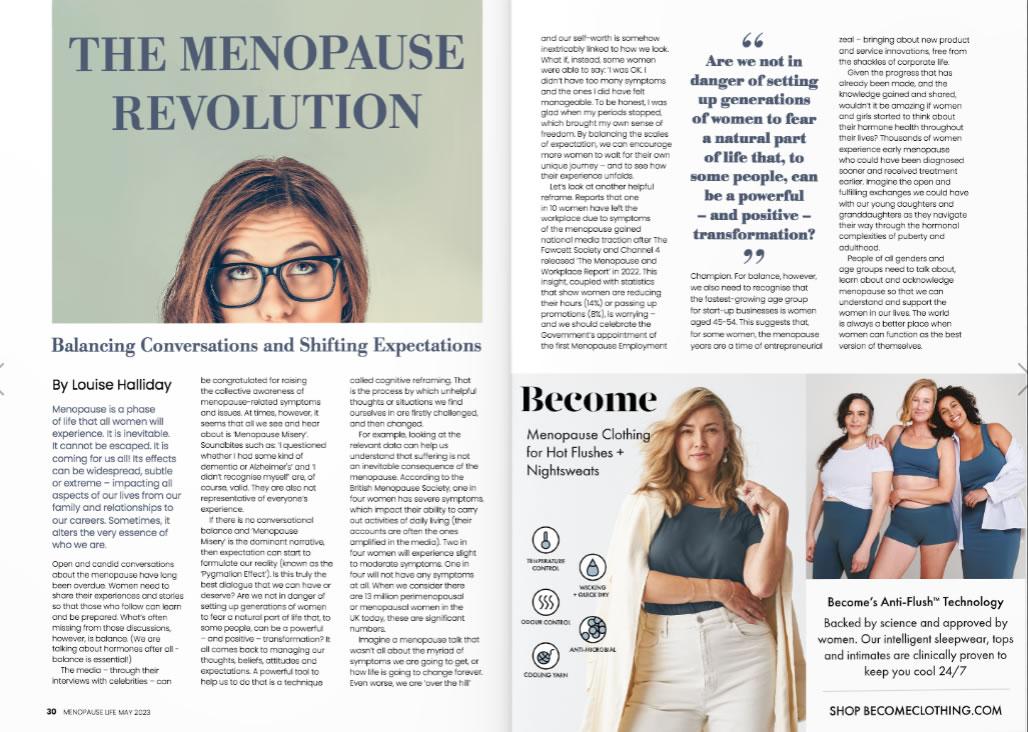
The menopause revolution – as featured in Menopause Life Magazine May
Menopause is a phase of life that all women will experience. It is inevitable. It cannot be escaped… It is coming for us all!
Its effects can be widespread, subtle or extreme – impacting all aspects of our lives from our family and relationships to our career. Sometimes, it alters the very essence of who we are.
Menopause is a phase of life that all women will experience. It is inevitable. It cannot be escaped… It is coming for us all! Its effects can be widespread, subtle or extreme – impacting all aspects of our lives from our family and relationships to our career. Sometimes, it alters the very essence of who we are.
Open and candid conversations about the menopause have long been overdue. Women need to share their experiences and stories so that those who follow can learn and be prepared. What’s often missing from those discussions, however, is balance. (We are talking about hormones after all… Balance is essential!)
The media – through their interviews with celebrities – can be congratulated for raising the collective awareness of menopause-related symptoms and issues. At times, however, it seems that all we see and hear about is ‘Menopause Misery’. Soundbites such as: ‘I questioned whether I had some kind of dementia or Alzheimer’s’ and ‘I didn’t recognise myself’ are, of course, valid. They are also not representative of everyone’s experience.
If there is no conversational balance and ‘Menopause Misery’ is the dominant narrative, then expectation can start to formulate our reality (known as the ‘Pygmalion Effect’). Is this truly the best dialogue that we can have or deserve? Are we not in danger of setting up generations of women to fear a natural part of life that, to some people, can be a powerful – and positive – transformation? It all comes back to managing our thoughts, beliefs, attitudes and expectations. A powerful tool to help us to do that is a technique called cognitive reframing. That is the process by which unhelpful thoughts or situations we find ourselves in are firstly challenged, then changed.
For example, looking at the relevant data can help us understand that suffering is not an inevitable consequence of the menopause. According to the British Menopause Society, one in four women have severe symptoms (1), which impact upon their ability to carry out activities of daily living (their accounts are often the ones amplified in the media). Two in four women will experience slight to moderate symptoms. One in four will not have any symptoms at all. When we consider there are 13 million perimenopausal or menopausal women in the UK today, these are significant numbers.
Imagine a menopause talk that wasn’t all about the myriad of symptoms we are going to get, or how life is going to change forever. Even worse, that we are ‘over the hill’ and our self-worth is somehow inextricably linked to how we look. What if, instead, some women were able to say: ‘I was OK. I didn’t have too many symptoms and the ones I did have felt manageable. Being honest, I was glad when my periods stopped, which brought its own sense of freedom’. By balancing the scales of expectation, we can encourage more women to wait for their own unique journey – and to see how their experience unfolds.
Let’s look at another helpful reframe. Reports that one in 10 women have left the workplace due to symptoms of the menopause gained national media traction after The Fawcett Society and Channel 4 released ‘The Menopause and Workplace Report’ in 2022 (2). This insight, coupled with statistics that show women are reducing their hours (14%) or passing up promotions (8%), is worrying – and we should celebrate the Government’s appointment of the first Menopause Employment Champion. For balance, however, we also need to recognise that the fastest-growing age group for start-up businesses is women aged 45-54 (3). This suggests that, for some women, the menopause years are a time of entrepreneurial zeal – bringing about new product and service innovations, free from the shackles of corporate life.
Given the progress that has already been made, and the knowledge gained and shared, wouldn’t it be amazing if women and girls started to think about their hormone health throughout their lives? There are thousands of women who experience early menopause who could have been diagnosed sooner and received treatment earlier. Imagine the open and fulfilling exchanges we could have with our young daughters and granddaughters as they navigate their way through the hormonal complexities of puberty and adulthood.
People of all genders and age groups need to talk about, learn about and acknowledge the menopause, so that we can understand and support the women in our lives. The world is always a better place when women can function as the best version of themselves.

